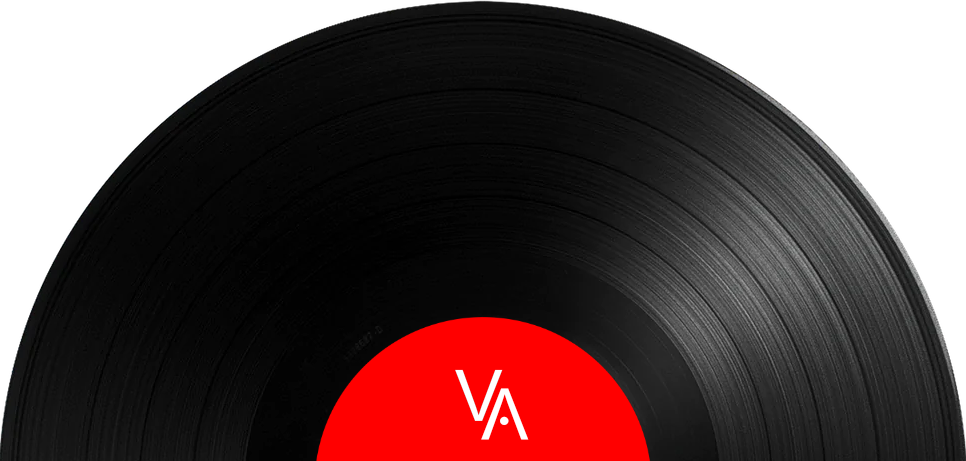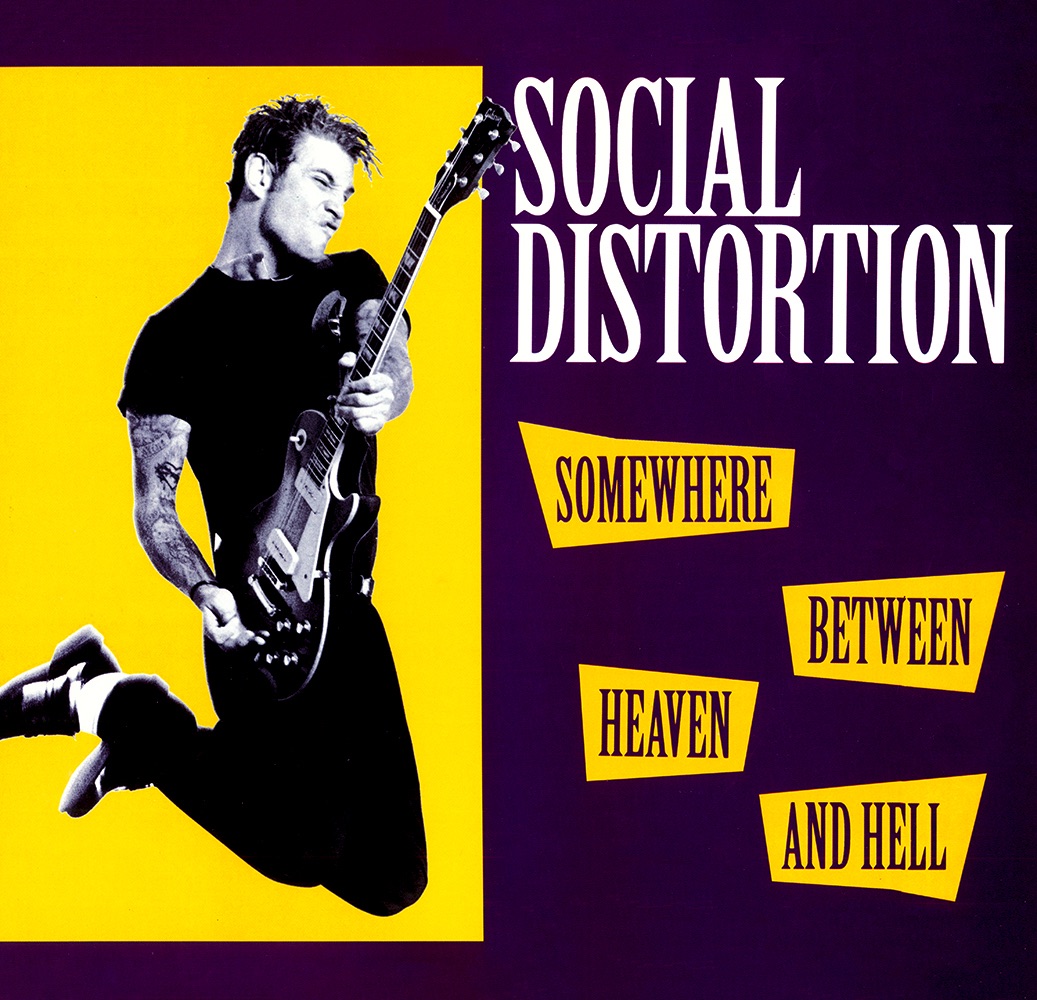
Somewhere Between Heaven And Hell is Social Distortion's fourth studio album, released in February, 1992. It followed the surprise success of their previous, self-titled LP's breakthrough singles Ball and Chain and Story of My Life and generated their highest-charting single, Bad Luck, which peaked at number two on the Modern Rock Tracks chart. It achieved gold certification in the US in and peaked at number 76 on the Billboard 200.
This is a great rock n' roll record. It fuses the band's country and rockabilly influences with punk and straight ahead rock. Listening to it, it's easy to see the influence such artists as Jonny Cash and Hank Williams had on the band.
It's been more than 20 years since this 37-minute blast of in your face rock-punk was unleashed, and it came just as grunge was taking hold, which probably contributed to its weaker than expected sales performance. Nirvana’s Nevermind was the Big Deal back then, and the band's record company - Epic - was hoping Social Distortion would continue to mine that musical vein. All the record companies were competing to sign up almost any band from Seattle, and the way Epic probably saw it Social Distortion, although not a Seattle band, sounded rough-around-the-edges enough to stand a chance of being the Next Big Grungy Sounding Thing.
The fun kicks off with a blistering Cold Feelings that scarcely takes a breath before charging head-on into into Bad Luck. The pace doesn't let up, not for one hot second. Other standout tracks are Born To Lose and 99 To Life, but really, there's isn't a bad note on either side of this slice of wax.
My copy is an original pressing and I smile every time I put it on and crank it up. I also have a remastered CD version of Somewhere, but this pressing sounds better. That's analogue for you! There have been many subsequent reissues but most were digitally sourced. This is the one you want, if you can find it. And you'll pay up to $100 if you do.
Social Distortion had a hard birth. There were addiction issues among band members that probably made them seem unreliable to most labels, resulting in a few self-financed recordings before they finally signed with Epic.
Their self-titled third album was released on Epic in 1990 and slammed hard into the Billboard charts. In addition to the aforementioned singles, the record also spawned a wicked cover of Johnny Cash's Ring of Fire - one of the best covers of that song I've ever heard.
Social Distortion's punk-in-chief, Mike Ness, was always a punker at heart. But he also loved the classic country sound - he lists Hank Williams among his musical heroes - and decided to merge the two genres, which became the band's signature sound. Cowpunk, some people called it. But in the late ’80s they weren't the only band attempting to do this sort of thing, although not everybody sounded as genuine as Social Distortion did. They really meant it.
Ness recalls what that was like. “When I see everyone doing the same thing, I want to do the opposite," he told the AV Club, in 2011. "I just got so sick of tattooed Dickies-wearing guys in bands trying to sing pop-punk songs that sound the same. It just made me grateful that we have our own direction and our own sound. That started in the mid-’80s. All these hardcore bands sounded all the same. God, why do you want to do the same thing everyone else is doing?”
On Somewhere Between Heaven and Hell, Ness and the boys stay true to the music, never bending to acknowledge the latest trend. But Epic expected a commercially successful record. Ness, however, was adamant. “You can't think that way," he told the Los Angeles Times just prior to this record's release. "It interferes with creativity. Sure, there’s pressure. But it’s not like when I’m writing the songs I’m thinking about radio airplay. It’s just self-indulgence. I’m writing for me and hoping other people like it.”
Despite heavy promotion and MTV support it seemed the record buying masses weren't ready for a punk band with a pronounced rockabilly influence. Although Bad Luck became Social Distortion’s highest-charting hit single, the record - and the band - didn’t take off in the way their label had predicted and bet on.
The record would eventually go gold in 2000, many years after Social Distortion released their final album. It's a record people have come around to over time, which is often the case with the good stuff.
And this really is some good stuff!
Somewhere Between Heaven And Hell is Social Distortion's fourth studio album, released in February, 1992. It followed the surprise success of their previous, self-titled LP's breakthrough singles Ball and Chain and Story of My Life and generated their highest-charting single, Bad Luck, which peaked at number two on the Modern Rock Tracks chart. It achieved gold certification in the US in and peaked at number 76 on the Billboard 200.
This is a great rock n' roll record. It fuses the band's country and rockabilly influences with punk and straight ahead rock. Listening to it, it's easy to see the influence such artists as Jonny Cash and Hank Williams had on the band.
It's been more than 20 years since this 37-minute blast of in your face rock-punk was unleashed, and it came just as grunge was taking hold, which probably contributed to its weaker than expected sales performance. Nirvana’s Nevermind was the Big Deal back then, and the band's record company - Epic - was hoping Social Distortion would continue to mine that musical vein. All the record companies were competing to sign up almost any band from Seattle, and the way Epic probably saw it Social Distortion, although not a Seattle band, sounded rough-around-the-edges enough to stand a chance of being the Next Big Grungy Sounding Thing.
The fun kicks off with a blistering Cold Feelings that scarcely takes a breath before charging head-on into into Bad Luck. The pace doesn't let up, not for one hot second. Other standout tracks are Born To Lose and 99 To Life, but really, there's isn't a bad note on either side of this slice of wax.
My copy is an original pressing and I smile every time I put it on and crank it up. I also have a remastered CD version of Somewhere, but this pressing sounds better. That's analogue for you! There have been many subsequent reissues but most were digitally sourced. This is the one you want, if you can find it. And you'll pay up to $100 if you do.
Social Distortion had a hard birth. There were addiction issues among band members that probably made them seem unreliable to most labels, resulting in a few self-financed recordings before they finally signed with Epic.
Their self-titled third album was released on Epic in 1990 and slammed hard into the Billboard charts. In addition to the aforementioned singles, the record also spawned a wicked cover of Johnny Cash's Ring of Fire - one of the best covers of that song I've ever heard.
Social Distortion's punk-in-chief, Mike Ness, was always a punker at heart. But he also loved the classic country sound - he lists Hank Williams among his musical heroes - and decided to merge the two genres, which became the band's signature sound. Cowpunk, some people called it. But in the late ’80s they weren't the only band attempting to do this sort of thing, although not everybody sounded as genuine as Social Distortion did. They really meant it.
Ness recalls what that was like. “When I see everyone doing the same thing, I want to do the opposite," he told the AV Club, in 2011. "I just got so sick of tattooed Dickies-wearing guys in bands trying to sing pop-punk songs that sound the same. It just made me grateful that we have our own direction and our own sound. That started in the mid-’80s. All these hardcore bands sounded all the same. God, why do you want to do the same thing everyone else is doing?”
On Somewhere Between Heaven and Hell, Ness and the boys stay true to the music, never bending to acknowledge the latest trend. But Epic expected a commercially successful record. Ness, however, was adamant. “You can't think that way," he told the Los Angeles Times just prior to this record's release. "It interferes with creativity. Sure, there’s pressure. But it’s not like when I’m writing the songs I’m thinking about radio airplay. It’s just self-indulgence. I’m writing for me and hoping other people like it.”
Despite heavy promotion and MTV support it seemed the record buying masses weren't ready for a punk band with a pronounced rockabilly influence. Although Bad Luck became Social Distortion’s highest-charting hit single, the record - and the band - didn’t take off in the way their label had predicted and bet on.
The record would eventually go gold in 2000, many years after Social Distortion released their final album. It's a record people have come around to over time, which is often the case with the good stuff.
And this really is some good stuff!


